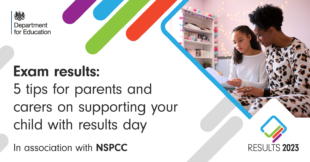
We know results day can be a stressful time for everyone, and it can feel like there’s a lot riding on the grades that your child gets.
Whatever their results, it’s important to remember that there are many different options out there, with lots of high-quality routes into further study, the workplace or a combination of both.
We’ve teamed up with NSPCC Childline to share its top tips on how you can best support your child on results day and beyond if they’re feeling nervous.
1. Encourage your child to speak about how they feel
Start the conversation about your child’s future before results day. This will give them time to discuss any anxieties or hopes they might have and will help them feel clearer about their options once their results arrive.
2. Celebrate your child, whatever their results
Whatever results your child receives, results day comes after years of hard work, so it’s important they feel celebrated.
Employers look for a range of skills and these qualifications are a steppingstone to exciting opportunities including study, apprenticeships, work, travel and more.
You can familiarise yourself and your child with all the options out there on the Get the Jump website.
3. Avoid comparison with others
It can be easy for young people to compare themselves to their peers, but each child is unique and their results are too.
Avoid comparing your child to family members or their friends, and instead focus on their own specific achievements.
4. Allow your child to take their time
Your child may find it hard to talk to you about their results so be patient and supportive until they feel ready to discuss about how they feel. Encourage them to speak to their school, college or university.
Help them to make a plan B before results day, and allow them to take their time to think about what they want to do next. Whatever their results, there are lots of options available and there is more than one route into most careers.
Help them think about their choices by writing down a list of pros and cons for each of their options.
5. Encourage your child to speak to another trusted adult
A safe adult – whether this is a teacher or another family member – can help to give useful perspective and advice.
Schools and colleges are well equipped to provide support and expertise on next steps, and your child’s teachers are usually their best first port of call.
If they’re finding it hard to talk to someone close to them or someone at school, let them know they can contact Childline for free, confidential support and advice on 0800 1111 or www.childline.org.uk. Childline is always there for young people to discuss their worries and anxieties on this topic and others.
Young people can also talk to a professional careers adviser for free and get judgment-free, confidential information and advice via the National Careers Service Exam Results helpline, via phone on 0800 100 900 or use webchat.